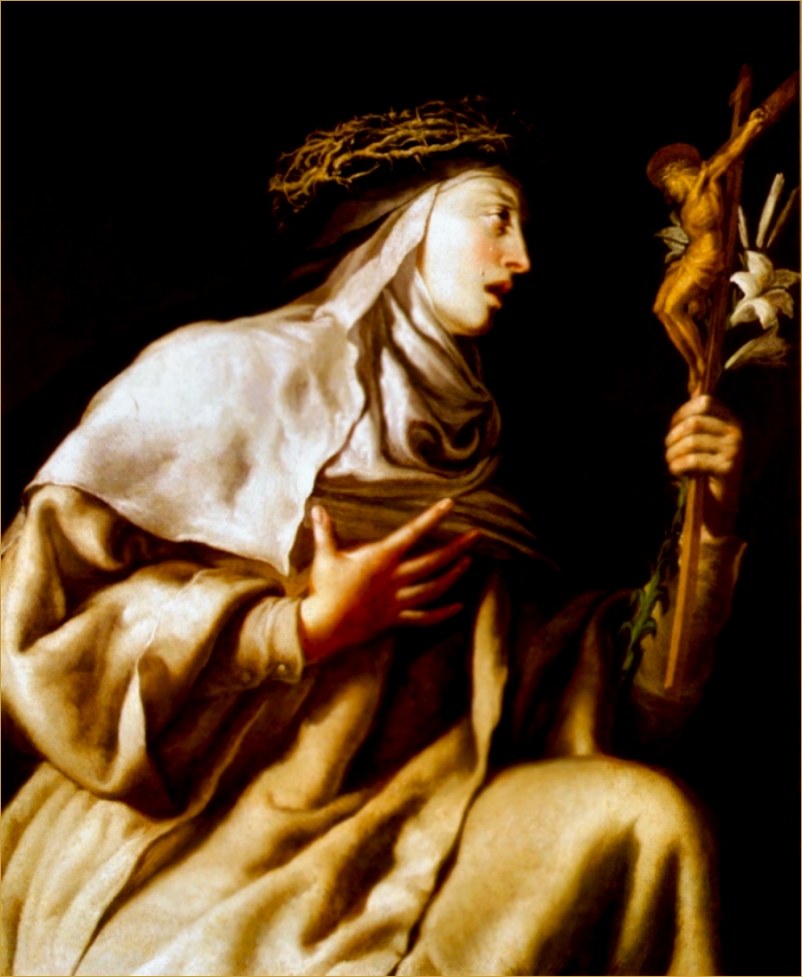Teresa of Avila Outmaneuvered A Male Dominated Organization
/ Artist currently unknownNote from Anne: This informative post by Bro. Solomon on Teresa of Avila, the founder of his and Bro. Dennis’ Carmelite order is an extension of my 2Ps in a Pod blog, written between myself and Bro. Dennis, founder of Carmel Laboratories, maker of Easeamine anti-aging skin care products.
Artist currently unknownNote from Anne: This informative post by Bro. Solomon on Teresa of Avila, the founder of his and Bro. Dennis’ Carmelite order is an extension of my 2Ps in a Pod blog, written between myself and Bro. Dennis, founder of Carmel Laboratories, maker of Easeamine anti-aging skin care products.
Regular readers at AOC know that my personal relationship with organized religion is tenuous at best except for congregations like the Episcopalian and Presybeterian Churches or reform Judaism. My views in no way dishonor the importance of spirituality and God-driven beliefs in our lives. I have vigorously condemned the negative impacts of fundamentalist theology on women’s lives worldwide.
At the same time, I am a peacemaker seeking to align myself with people where our similarities are many and differences few. This alliance describes my personal relationship with Bros. Dennis and Solomon and the entire Easeamine team.
After careful consideration of how to align the editorial content coming out of my expanding relationship with Easeamine, I believe Bro. Solomon’s post belongs in Women, as an offset to our larger AOC discussion about women and religion.
We will make every effort to highlight the positive stories about religious women without backing down on our criticism of every trend that seeks to declare America a theocracy, which is the goal of social conservatives of every religious persuasion. AOC’s editorial policy supports the concept of individual rights as declared in the US Constitution and outlined more fully in The Bill of Rights. In particular we support the 14th Amendment as it has been interpreted by the US Supreme Court.
Seeking to promote public discourse and education that emphasizes our shared visions with others and not our disagreements, we respect the individual differences and outright rejection in some cases of AOC’s public positions by some of our talented writers and thinkers, such as Bro. Solomon and Bro. Dennis.
Celebrating Teresa of Avila, Founder of the Carmelite Order
“Thank you, every woman, for the simple fact of being a woman! Through the insight which is so much a part of your womanhood you enrich the world’s understanding and help to make human relations more honest and authentic.” –Pope John Paul II, Letter to Women, June 29, 1995
In a male dominated Church we often lose fact that in essence the Church is feminine. We call the Church “Mother”. When someone is baptized we see it as the Church “giving birth”. The Virgin Mary holds a prominent place in Church life and devotion. Of course this stems from what John Paul called the “feminine genius”.
 Bernini’s statue of St Teresa in Ecstacy in Rome.The role of women in the Church has been somewhat overshadowed at times because of an exclusively male clergy, but this does not mean that they have not been leaders, prophets, teachers and even at times hope for all the people of God! We only have to think of great female figures how went against the “status quos”. Being myself a Carmelite I think of our founder Teresa of Avila (March 28, 1515 – October 4, 1582) who reformed a religious order of monks and nuns, which had become lax and deserted it’s founding ideals.
Bernini’s statue of St Teresa in Ecstacy in Rome.The role of women in the Church has been somewhat overshadowed at times because of an exclusively male clergy, but this does not mean that they have not been leaders, prophets, teachers and even at times hope for all the people of God! We only have to think of great female figures how went against the “status quos”. Being myself a Carmelite I think of our founder Teresa of Avila (March 28, 1515 – October 4, 1582) who reformed a religious order of monks and nuns, which had become lax and deserted it’s founding ideals.
Women in the Church
Before Teresa reached a state of actualization of her person she had a very poor image of her womanhood feminine contribution to the Church, she says in her work ‘The Way of Perfection’: “I realized I was a woman and wretched and incapable of doing any of the useful things I desired to do in the service of the Lord”.
Does she say this because she feels inadequate because she is a woman? Or does she say this because of the lack of opportunity that women had in the Church because of her gender? My answer would be the latter.
Women who became nuns in the 16th century had no other options but to be cloistered and encased in a monastery for the rest of their lives. Teresa saw a need in the Church for reform yet what could she do? God had other plans for her destiny. She would reform an Order of men!, found over 15 monasteries for nuns, correspond with bishops and her avid supporter the king of Spain, and become the first woman Doctor of the Church along with Catherine of Siena in 1970. The title means that a person has contributed an exceptional amount of spirituality in the life of the Church; and for hundreds of years this title was only given to men.
The reform that Teresa set about doing was not welcomed with “open arms”; many authorities both ecclesiastical and public were opposed to it. Teresa herself was brought in front of the Spanish Inquisition to answer false suspicions about the reform.
Yet there were many bishops and priests who transcended the pettiness and supported Teresa. In the end though without the help of Philip II King of Spain, Teresa reform would not have survived, it was through his mediation that the reformed part of the Carmelites were made a separate juridical entity within the Catholic Church. In fact King Philip II said that “The reform of Teresa is one of the brightest jewels in the crown of Spain.”
The thought about reforming the Carmelite nun’s way of life came about during a conversation, which took place in Teresa’s room with a few other nun’s and relatives. They were talking about how the first hermits lived on Mt. Carmel in Israel and had a life of silence, solitude and total poverty in which they depended on God to provide their needs through the generosity of people, and that there were few so as not to be institutional.
These became the hallmarks of the Teresian reform. From this conversation Teresa went about reviving these ideals and making them reality.
No More Maidservants
The monastery in which Teresa resided was a very devout one in which were many holy and pious nuns. The problem was there were over 150 of them, and it was very difficult to have the silence and reflection one needed to live a contemplative life.
 In Spain you often can see Teresa of Ávila wearing a black bonete: The reason therfore is, that she was named in 1970 a Doctor of the Church by Pope Paul VI.
In Spain you often can see Teresa of Ávila wearing a black bonete: The reason therfore is, that she was named in 1970 a Doctor of the Church by Pope Paul VI.
When a woman entered a monastery she not only brought with her a dowry (an amount of money given to the monastery by the nun’s family in order to take care of her needs) but also her maidservants if she came from a wealthy family, and this added to the number of occupants in the monastery.
In Teresa’s new monastery there would be no maids and all the nuns would be equal, Teresa smashed down the classes of nobility and insisted that the nuns all live as sisters “in this monastery all should be held dear and all should be loved”.
If we put Teresa in her historical context, which was 16th century Spain we can see how her spirituality helped her to rise above the societal restrictions put upon women of her time. Dr. J. Ruth Aldrich in her essay entitled ‘Teresa, A Self-Actualized Woman’ had this to say about Teresa’s familial situation: “Teresa was born in 16th century Spain, a world like the present one, hostile to the self-actualized person male or female, but an especially difficult world in which to survive as a woman, self actualized or not.”
Dr. Aldrich goes further to explain what self-actualized person is one “who possesses qualities that facilitate survival-psychological, spiritual and physical-within the confines of existing power and political structures.” Teresa mentions in her Autobiography “just being a woman is enough to have my wings fall off”.
Teresa was well aware of the challenges for women who were looked upon as “bread ovens” for having children. Her own mother who was her father’s second wife bore nine children in eleven years, which was not an atypical experience for married women of this time period. Women’s mortality rates were seriously impacted by contiguous childbearing.
Self-Actualization with Limited Options
In Spain a woman had two choices 1) to get married or 2) enter a convent, leaving not a lot of options. At one time Teresa chided her nun’s for not being grateful that in being nuns, they failed to see the “great favor that God has shown them in choosing them for his service and thus saving them from subjection to a man.”
Teresa is an example of how a woman can maneuver in a male dominated organization. Because of her feminine wisdom and qualities many people who met her were irresistibly taken by her and looked up to her as a wise sage and a friend they wanted on their side. Because the spirit of God gave Teresa the ability to transcend beyond the social dictates of the time she has left a legacy for many other women in the Church to emulate. I close with another great quote from her “To have courage for whatever comes in life - everything lies in that.”
Blessings to all, Bro. Solomon
 St. Teresa of Avila Before the Crucifix by Guidi Cagnacci
St. Teresa of Avila Before the Crucifix by Guidi Cagnacci




















































